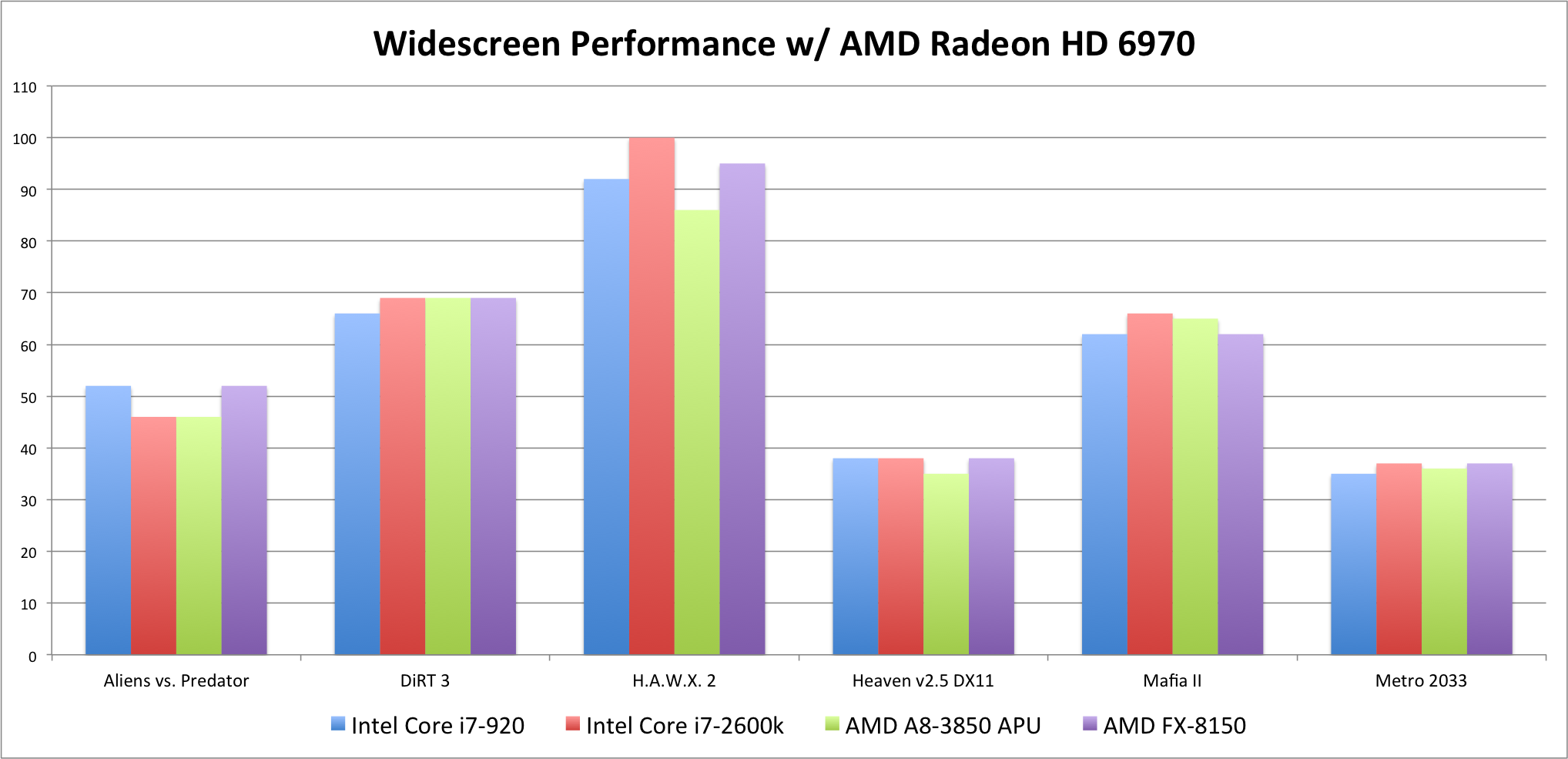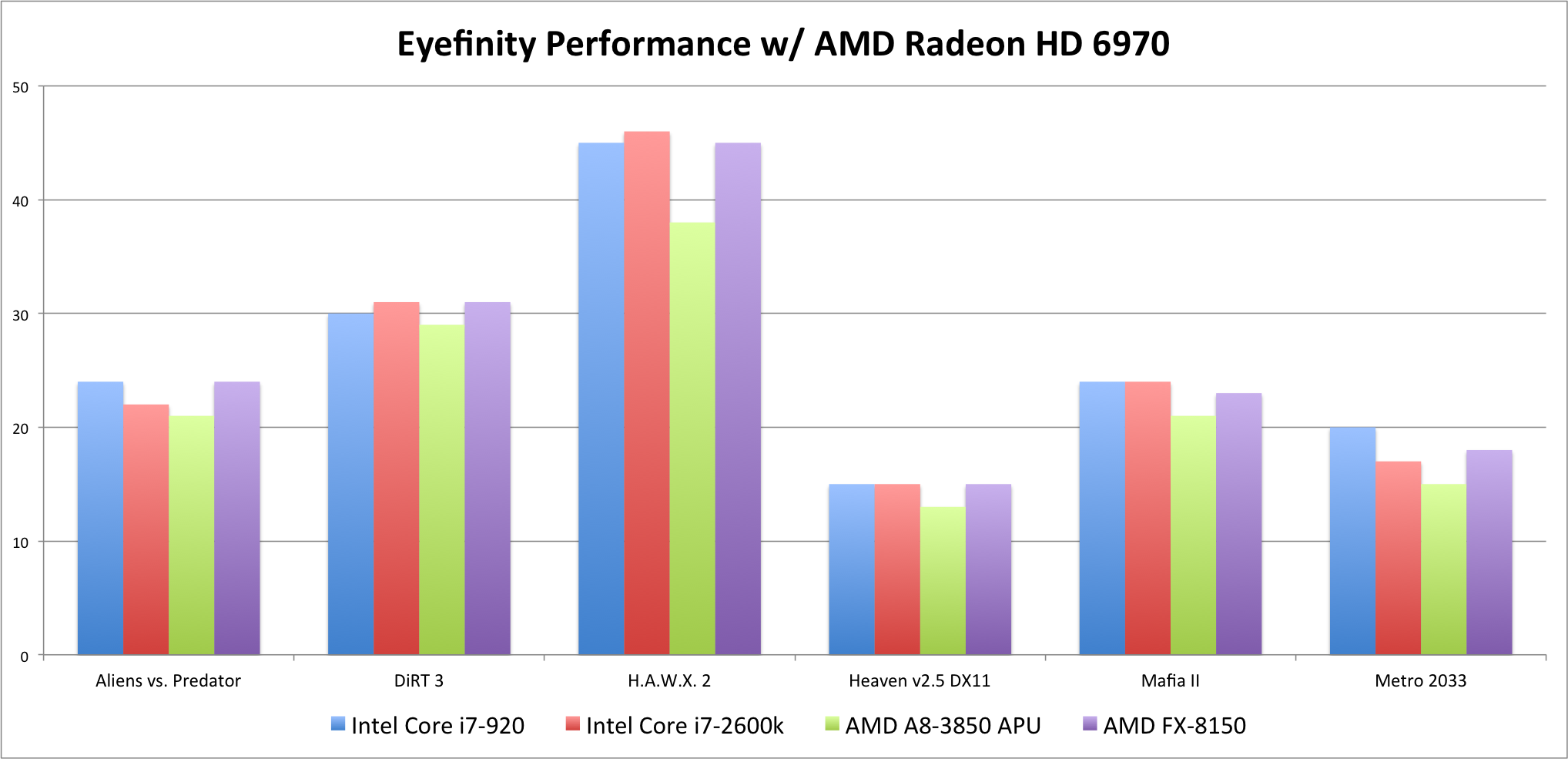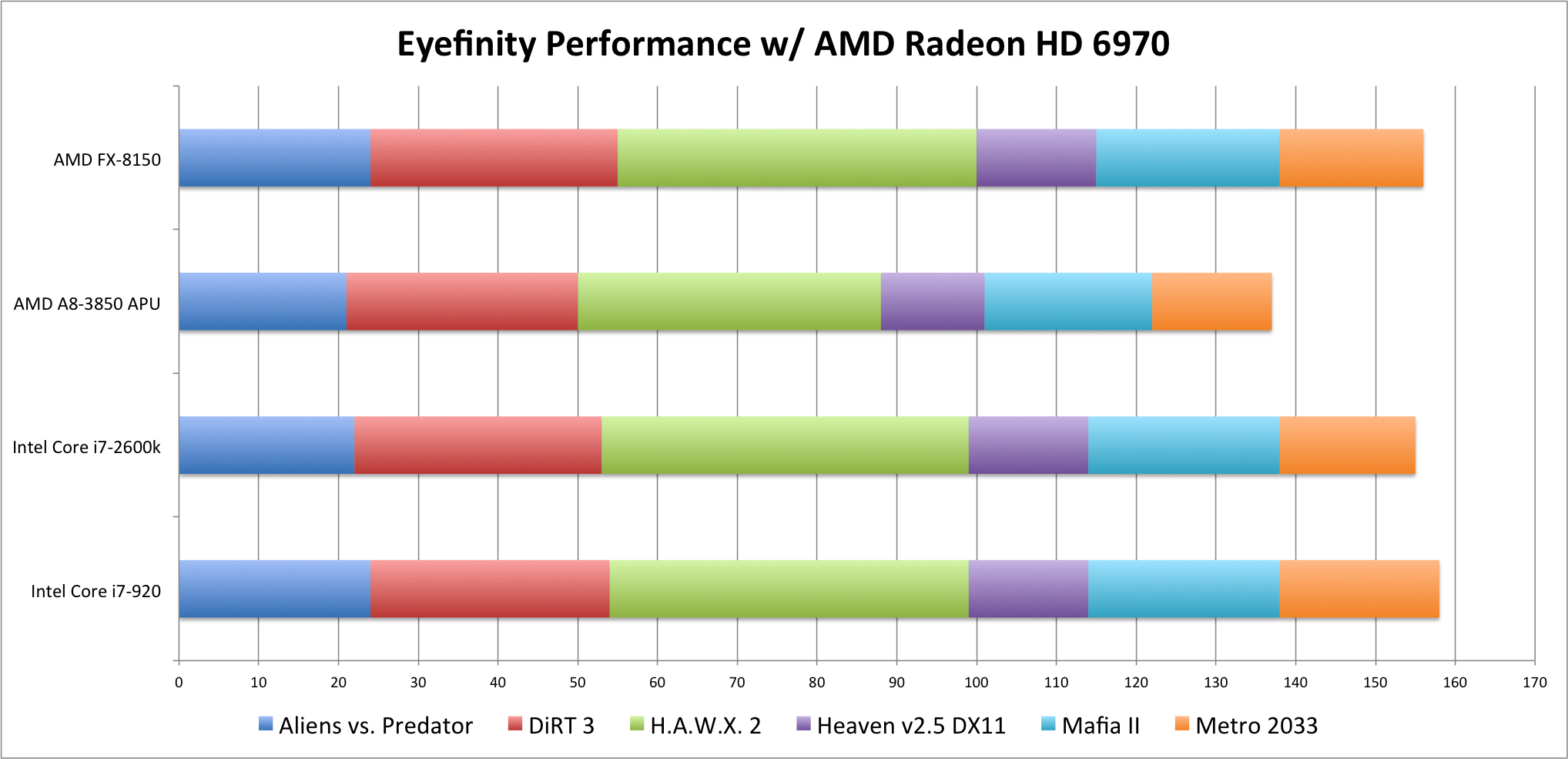CPU Showdown - September 2012
A while back (a year actually) AMD sent me an FX-8150 CPU (and motherboard). I didn't end up doing much with the hardware, except for building a second test rig that sat on a shelf in my office. Around this same time, AMD sent me chips and boards in their APU line line. During this timeframe I was able to get reviews out for these APUs - the E-350 and the A8-3850, but the FX-8150 sat dormant on my shelf.
So, I thought I'd dust off the old FX-8150 and set some baselines here at the WSGF. Last year I did some benchmarking with a Radeon HD 6970 card, and that is the benchmarks you see here. Granted, that is now an "old" card, but I think the data we present will be applicable none the less. I have started retesting my current platforms I have on hand with newer GPUs (the Radeon HD 7k series), and I think that data will be interesting as well - especially considering that I'm now testing APUs that aren't on the market quite yet...
| CPU | Cores | Threads | Clock (GHz) | L2 Cache | TDP (Watts) | Socket | Memory | MSRP* | |
| AMD | A8-3850 | 4 | 4 | 2.9GHz | 4x 1MB | 100W | FM1 | DDR3-1866 | $135 |
| AMD | FX-8150 | 8 | 8 | 3.6 GHz | 8x 1MB | 125W | AM3+ | DDR3-1866 | $179 |
| Intel | Core i7-920 | 4 | 8 | 2.66 GHz | 4x 2MB | 130W | LGA 1366 | DDR3-1066 | $284 |
| Intel | Core i7-2600k | 4 | 8 | 3.4 GHz | 4x 2MB | 95W | LGA 1155 | DDR3-1333 | $317 |
| *MSRP reflects price at time of product launch. For current product pricing, see the "Final Thoughts" section of this article. | |||||||||
Performance
For our testing we ran our current gaming suite at 1080p and 3s1080p Eyefinity. The Intel Core i7-920 hardware was the test rig the WSGF has used for a couple of years. The Intel Core i7-2600k is the upgrade of that test rig. The AMD APU A8-3850 and CPU FX-8150 are testbeds built around hardware provided by AMD. Since the initial testing last year I have passed along the A8-3850, but I will be using the FX-8150 for future articles and benchmarks.
You can see from the graphs below that all of the test environments performed similarly, when a Radeon HD 6970 was installed. From today's stance, the HD 6970 is a last generation GPU, but it still provides a strong baseline for this CPU shootout.
The differences between all of the CPU platforms outlined here are negligible. Sum total the highest performing CPU is within 10% of the lowest performing CPU for single screen performance. Similar data shows itself in the Eyefinity data, where the highest and lowest CPU numbers are separated by less that 15%.




Final Thoughts
| Total Frames |
Launch Price | Current Price* | ||||
| Price | Frames/$$$ | Price | Frames/$$$ | |||
| AMD A8-3850 | 337 | $135 | 2.50 | $95 | 3.55 | |
| AMD FX-8150 | 353 | $245 | 1.44 | $189 | 1.87 | |
| Intel i7-920 | 345 | $284 | 1.21 | $150 | 2.30 | |
| Intel i7-2600k | 356 | $317 | 1.12 | $299 | 1.19 | |
| * Intel i7-920 "current price" based on used CPU sales via eBay. | ||||||
| Total Frames |
Launch Price | Current Price* | ||||
| Price | Frames/$$$ | Price | Frames/$$$ | |||
| AMD A8-3850 | 137 | $135 | 1.01 | $95 | 1.44 | |
| AMD FX-8150 | 156 | $245 | 0.64 | $189 | 0.83 | |
| Intel i7-920 | 158 | $284 | 0.56 | $150 | 1.05 | |
| Intel i7-2600k | 155 | $317 | 0.49 | $299 | 0.52 | |
| * Intel i7-920 "current price" based on used CPU sales via eBay. | ||||||
In my testing, the most cost-effective chip is the AMD A8-3850 APU. Whether you intended to use its GPU capabilities or not, it provides a massively cost effective CPU - and one that is cool and quiet to boot. Even if you're not willing to "step down" to an APU, you need to give solid consideration to the FX-8150.
The often maligned CPU turned out a better gaming ROI than the Intel chips. The only instance where the Intel chips provided a better ROI (frames/$$$) was when looking at purchasing a used Intel Core i7-920 via eBay.
Other reviews may have pointed out how the Intel chips beat AMD in Prime95 computations, or productivity scenarios such as video encoding.
But ask yourself this - does your use case center around these heavily multi-threaded apps? Probably not; at least not on your gaming rig. This is the Widescreen GAMING Forum, and our focus is on real-world gaming scenarios.
So, what are our final thoughts here? From a gaming perspective, it is this....
And, can you blame us for this conclusion? You might be surprised, but is it wrong? The answer is no. The AMD A8-3850 is 1/3 the cost of the Intel Intel Core i7-2600k, but it produces real-world gaming performance at 90% of its high-end rival.
Should your next rig be an A8-3850? Probably not, considering the A10 chips are eminent - but the data is irrefutable... For a fraction of the cost, the the AMD APU carries almost the same gaming performance of the high-end Intel CPU.
For 90% of the performance, what can you do with the $200 saved by choosing the AMD APU?
- Choosing a 256GB SSD as your primary (or only) drive. The Corsair m4 256GB is less than $190 at the time of this writing.
- Buy a dedicated GPU, such as the the Radeon HD 7850. For less than $200 you can buy this 2GB GPU.
- Purchase the Corsiar K90/M90 combo mouse and keyboard.
It seems that as gamers we've been programed to get the "best of the best". The reality is that we need to investigate and find the components that gives us the best balance - the best "bang for our buck". For far too long many of us have looked to the "best that money can buy". What if the best is really overkill?
However, if you're a "regular" user - a gamer - who uses their rig to check email, surf the web, and play games; you're better off looking holistically at where your dollars are spent.
The AMD FX-8150 was largely panned by the mainstream tech press. It underwhelmed and was overpriced. The "underwhelmed" may be true, but now that that the price has come down to a reasonable level, it deserves a serious look. The AMD FX08150 is currently $100 less than an Intel CPU in a similar performance bracket.
Looking at our real-world gaming performance data, the AMD FX-8150 delivers almost the exact same results as the Intel Core i7-2600k - and does it for $100 less. That $100 could be invested in a better GPU or an SSD that would give more real-world usability improvements.
Getting a marginally faster CPU won't give you a better boot (Windows) or gaming experience. A couple hundred hertz simply don't make a difference. But, take that $100 and give yourself a better GPU, and you'll see the gameplay improvement. Or, take that $100 and get yourself a 128GB SSD for a boot drive, and you'll swear your PC was lightyears faster than it really is.
If you are a scientific or media professional, then your professional apps might be better served by a higher end CPU that is targeted at multi-core parallel processing. However, if you're a "regular" user - a gamer - who uses their rig to check email, surf the web, and play games; you're better off looking holistically at where your dollars are spent.
